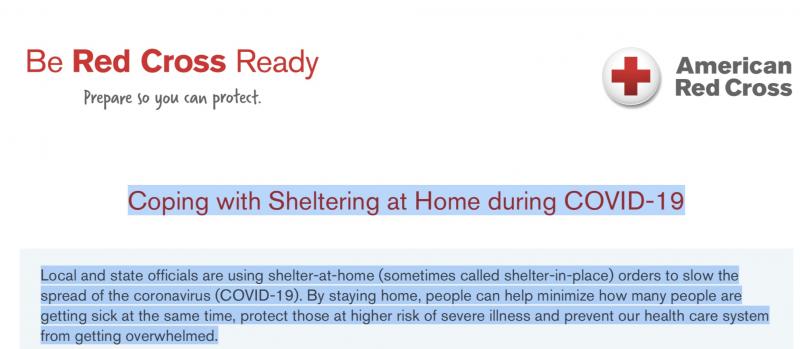Dale Rowley, Waldo County Emergency Management Agency director, sent along the following from the American Red Cross: Local and state officials are using shelter-at-home (sometimes called shelter-in-place) orders to slow the spread of the coronavirus (COVID-19). By staying home, people can help minimize how many people are getting sick at the same time, protect those at higher risk of severe illness and prevent our health care system from getting overwhelmed.
Unfortunately, sheltering at home can disrupt your routines and make everyday activities, such as work and caring for loved ones, challenging. These changes, on top of the general uncertainty around this pandemic, can create feelings of stress, fear and nervousness. These feelings are normal, and people typically bounce back after difficult times.
The following information can help you cope with stress and support others during this emergency.
What is Sheltering at Home?
Sheltering at home means that you remain at home, and only go out to purchase essential supplies, visit medical professionals or leave during an emergency.
Following the instructions of local officials will help keep you and your loved ones safe.
It’s normal for people to have these types of feelings right now:
Fear about running out of essential supplies.
Anxiety, particularly about being separated from loved ones.
Uncertainty about how long you will need to shelter at home.
Concerns for your physical safety and that of others.
Fear of getting sick.
Guilt about not being able to fulfill responsibilities, such as work, parenting or caring for dependents.
Boredom or isolation.
Thoughts of blame, worry or fear.
Worry about loss of income.
Fear of being stigmatized or labeled by this illness, if you become sick.
Coping Tips
• Stay connected with loved ones through video calls, phone calls, texts or social media.
• Remain informed with accurate, reliable information. Avoid social media accounts and news outlets that promote fear or rumors.
• Monitor your physical health needs and those of your loved ones. Eat healthy food, and drink plenty of water.
• Unless you are showing signs of illness or have tested positive for COVID-19, going outside to exercise and walk pets is ok. But don’t forget to practice social distancing by keeping at least six feet away from others.
• Hold an image in your mind of the best possible outcome. Make a list of your personal strengths and use these to help both yourself and others stay emotionally strong.
• If you are religious or spiritual, follow practices at home that provide you with comfort and emotional strength.
Helping Others
- Reach out to older adults or people with chronic health conditions and offer to help. For example, offer to pick up groceries, medications and other essential supplies. Check in with them regularly but practice social distancing by keeping at least six feet away when you deliver essential items.
- Talk to your children and explain why this is happening and how long it might last. Use language that is normal and consistent with how you usually communicate. Be creative and think of fun activities that will occupy their time. Keep a schedule, set appropriate limits and maintain usual rules when possible.
• Take care of your pets, which can be an essential part of your support system. Like people, pets react to changes in their environment and routine, so their behaviors may change, as well. Keep track of their well-being and take care of their needs as best you can.
• Show kindness to people who may not have a support system or are isolated. There may be limits to what you can do in reaching out, but a little kindness may be just what someone needs.
Helpful Resources
- For the latest information, please visit the CDC website at cdc.gov/covid19.
- For information on staying safe, see redcross.org/coronavirus.
- Download the free Red Cross Emergency App and First Aid App by searching for American Red Cross in your phone’s app store or by going to redcross.org/mobileapps.
- Locate your state and local health departments at naccho.org/membership/lhd-directory.
- Call 211 or visit auntbertha.com for other local resources.
- The United Way has established a National COVID-19 Community Response and Recovery Fund. This assistance may be accessed by dialing 211 or visiting unitedway.org/recovery/covid19.
























